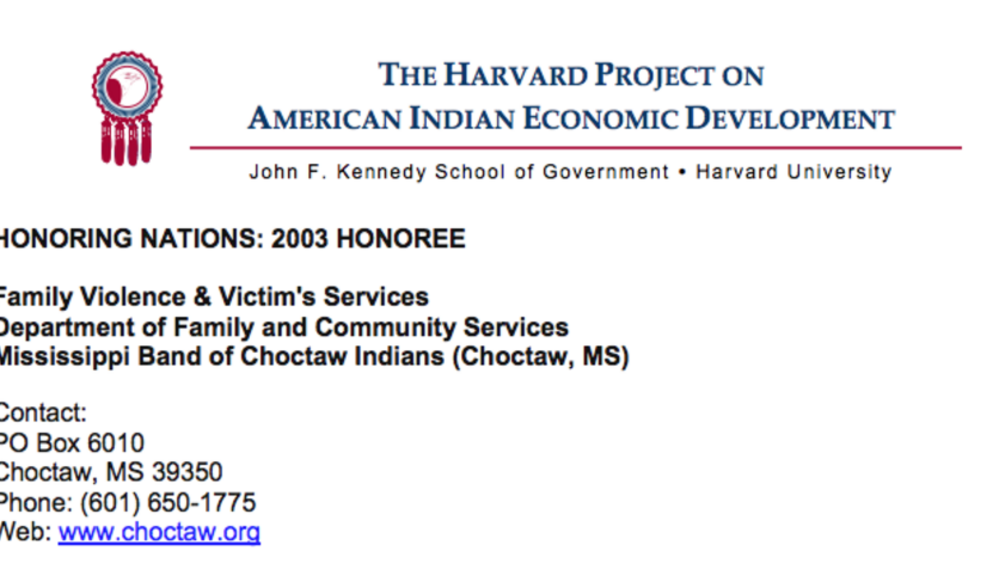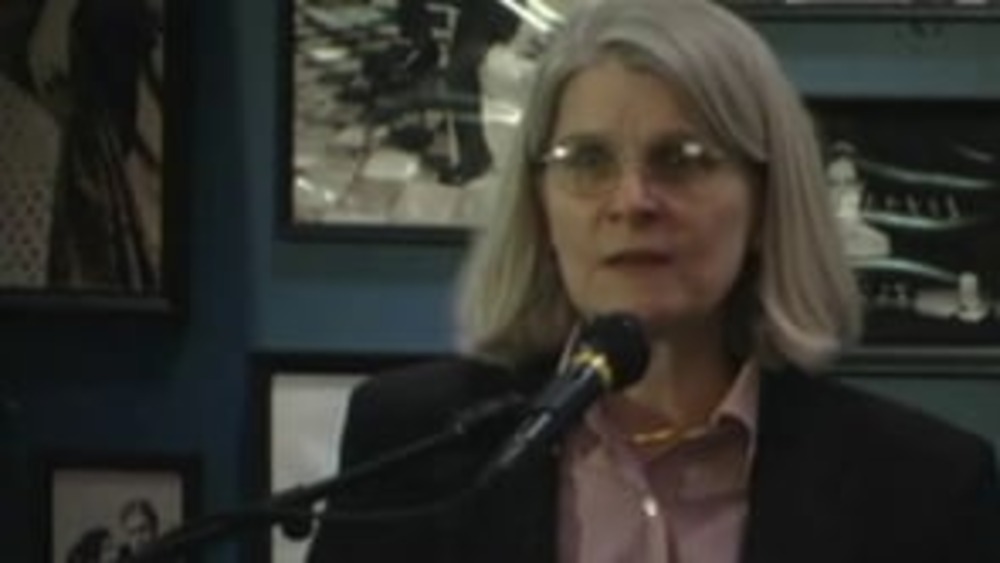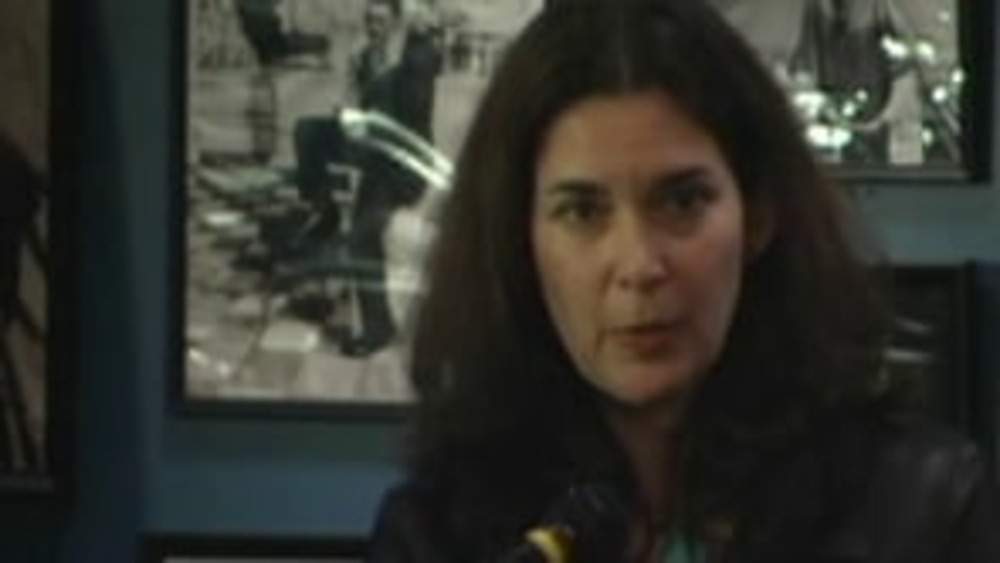Program representatives Tina Scott and Nan Smith provide an overview of Mississippi Choctaw's Family Violence & Victim's Services program and discuss how its integrated approach has improved the quality and effectiveness of the services it provides to Choctaw citizens.
Additional Information
Scott, Tina and Nan Smith. "Mississippi Band of Choctaw Family Violence and Victim's Services." Honoring Nations symposium. Harvard Project on American Indian Economic Development, John F. Kennedy School of Government, Harvard University. Cambridge, Massachusetts. September 11, 2004. Presentation.
Transcript
Tina Scott:
"Good morning. I'd like to introduce Nan Smith. She is my director for the family and community services on the Choctaw reservation in Mississippi."
Nan Smith:
"Good morning. We just kind of want to give you a short description, a quick description, of how the program came into being. The Department of Family and Community Services was created in 1999 when the chief and tribal council passed a resolution to create a department that would encompass all the family programs. And I call it 'all the problem programs on the reservation.' And we did something very unique when that happened. Behavioral Health, which is funded by Indian Health Services and is physically located at the Choctaw Health Center, was carved out organizationally and put under the department because we were having problems with Behavioral Health and Social Services communicating, and we still seem to have that problem a few years later. But that was, I think, really forward-thinking on the council's part that that was a good idea. It has helped. Our planning has greatly improved and then the more funding we got for family violence, we decided that in order to have their own identity, we found a building to put them in and pulled them out of the Social Services building. So that was real, I think, forward-thinking on our part in terms of it needed its own identity, it did not need to be part of Social Services although they serve the same families, but it was for different reasons.
And as those of you who are aware of when we got the award, we had an attorney that was the program director serving the program and now Tina came over from the health center and has assumed that responsibility. And so what we're doing in order to continue providing legal representation is Tina's going to serve as a lay advocate plus we are using some of our funds to contract out that service, but I'm going to let her talk more about that. But that in a way is very promising to us, because there were concerns when we were being reviewed for Honoring Nations that since we have an attorney, she's specialized, how's the program going to continue when Paula leaves? We have a solution and are also bringing a different perspective than what we had in terms of we were heavy on the legal side, now we're moving further into the case management side where we're able to...and so Tina was hired as a program director, not as an attorney. And so I really look forward to seeing a lot of improvement in the case-management perspective of that program. But I'll let her tell you more."
Tina Scott:
"Well, this is a wonderful program and we're so honored to be here. Amy [Besaw Medford] emailed me this huge paper maybe a month ago. I was like, 'Amy, what do you want me to do with this paper?' But anyway, let me tell you a little bit about the Family Violence and Victim Services on the reservation. It's sort of a...we like to think of as it a one-stop shop for victims and their families. It's confidential for one thing, it's comprehensive, and we feel that it's convenient for victims to come by and their families to come by. A lot of times, on any given day, at any given moment, you can have a man or a woman or a grandmother, an extended family member, aunt or uncle, come in with children and they may be in charge of those children for the weekend, for the week a month, they may not know and they have all these questions and we're able, we're so fortunate we're able to provide the answers for them. And if we can't, we have a legal defense, legal services department on the reservation that's able to take over for problems that we cannot solve, but a lot of times they come to us with questions and we're able to help them.
The history of domestic violence in Choctaw country, in Mississippi, goes as this: it was merely a family problem that should be left out of the court system. And so with that in your mind -- and you have all these against you coming -- it was really hard for people to set up this program in a way, and it's still a lot of taboo in certain cultures. Around 1998-99, as she mentioned, she was hired and then they hired an attorney to lay the groundwork for this program that was really needed on the reservation and they were able to do that. What they found out was they had a fragmented, the tribe already had money coming in, but they had this fragmented approach. They had money here, they had money there and they had personnel there. So they decided with tribal council approval to combine all the services for family violence under one roof and tribal council gave them the building and approval and they were able to move everybody into one building to give us this Family Violence and Victim Services program.
After this reorganization, they decided they needed some goals and one of the main important goals was to provide legal representation at no cost to the victim, and we're still doing that today and we're glad to be doing that. A domestic violence criminal code was established to mandate arrests for domestic violence-related crimes on the reservation. And another thing they looked at was the reporting. They wanted the police to start reporting, and we work really well with the police department on the tribe right now. They send us reports, we can pick it up or they could bring it over, but it could be daily, it could be weekly. We pretty much pick it up on a Monday from the weekend. So we're working really well with the law enforcement agency on the reservation and the schools. That's another thing. The schools have really helped us. They do their part in reporting any abuse. And another thing was increasing community awareness and we're still working on this. It's a lot of work when you're trying to get the community to buy into this, but I'll take a quote from Amy's report and it says, 'Children do not do well unless families do well and families do not do well unless communities do well.' And we've got this huge poster on our wall in the office and it says, 'When a mother cries, the children cry.' So that really gets to my heart because I have children.
So we've been, I think, fortunate and successful. We've received a lot of response to the program because we've been able to have support, tribal council support. And it's really important that when you're working on these social problems that you tell your leaders what is wrong or what you see and I'm sure that they see it too and they're probably being pulled in a lot of different directions. So it's important that you get their support when you're trying to establish these programs. And initially the tribal revenue funding was not there, but recently we have tribal revenue funding. So we're very fortunate that the tribe has recognized this need and has given us money. Besides federal or state funding, we have tribal funding. So that's really good to have that support from all the levels, different levels.
With the Harvard Project award we plan to have a website, we feel we should share this with other communities, probably in December of 2005, maybe January, if we encounter any difficulties; refusetoabuse.org is what we plan to use. And it's going to list everything from the initial start of this program up to present for those people who are interested in starting a program such as this in their communities. But that is another thing I wanted to mention was the paper touched a lot on self-determination. And I grew up on the reservation, I am Choctaw, I am a tribal member, I speak the Choctaw language, and I did not hear the term 'self-determination' until I was probably 16. I was competing in this pageant and that was one of the requirements was knowing what self-determination was. So you mentioned that a lot in the paper and now we like to know of it as 'Choctaw Self-Determination.' We've taken ownership of that term. It's not just self-determination, but Choctaw Self-Determination. And so I know about it and a lot of people know about it, we have it on our letterhead, on our envelopes, it's everywhere and it's important that you get people that are non-Indian working in your communities to buy into this concept. And we have a very dedicated staff of family violence and victim services who actually believe in this self-determination to strengthen families. But I wanted to thank you."
Nan Smith:
"Just to follow up on Tina's comment about self-determination, I'm real proud to say that out of the seven divisions I have within my department, which includes Social Services, Food Distribution, -- which is your basic commodities program -- the Elderly Activities center -- which we're real proud the tribe invested over $2 million to build a facility for us -- then we've got Family Violence, we've got Behavioral Health, Boys and Girls Club. And out of all seven, I have five division directors who are tribal members and I'm really thrilled with that. Like I said, with Tina coming over from the health center, her background is in public health administration, she's not an attorney, but there's no reason why she can't function as a lay advocate. She speaks the language, she's female, and most of our clients are Choctaw females, and so she's bringing a totally different flavor and we're real pleased to have her. And she hasn't been there very long and look at how much she knows about it already. So we're really pleased to have her and we're pleased to have been invited. Thank you."



